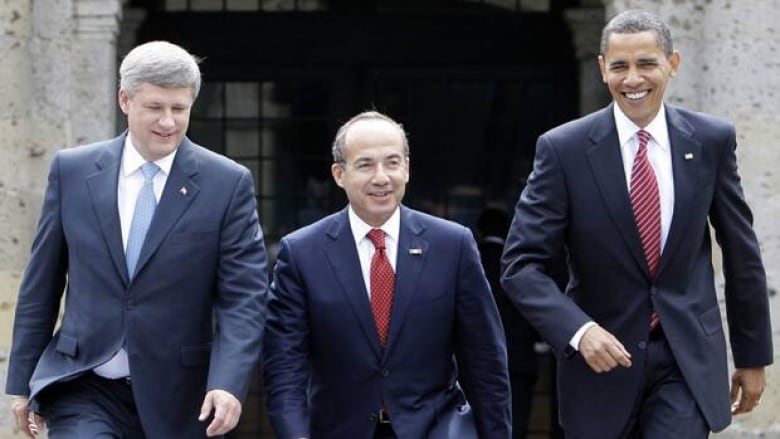Harper, Obama to meet in Hawaii
But Canada not part of new trade bloc announced at APEC meeting

Latest
- Canada not involved in proposed trade pact
Prime Minister Stephen Harper and U.S. President Barack Obama will hold a bilateral meeting Sunday at the Asia-Pacific economic conference in Hawaii.
Harper and Obama had been scheduled to sit down Sunday night with Mexican President Felipe Calderon, who pulled out of the 21-nation Honolulu summit after a helicopter crash on Friday about 70 kilometres south of Mexico City killed Interior Minister Francisco Blake Mora and other Mexican government officials.
There are a number of issues that Harper would like to discuss with his counterpart, the CBC's Laurie Graham reported from Honolulu, including U.S. protectionist moves — most recently the new "Buy American" clause in Obama's America Jobs Act — the now delayed Keystone pipeline deal and the proposed border perimeter deal.

Weather conditions appear to have been a factor in the helicopter crash that killed his top cabinet official, Mexican President Felipe Calderon said Saturday. Calderon said the helicopter carrying Interior Minister Francisco Blake Mora, pictured above, was flying in foggy conditions and the crash "was probably an accident." Mora, 45, had led the push to clean up Mexico's notoriously corrupt state and local police forces.
– Associated Press
Harper's office offered his condolences after learning of Blake Mora's death.
"Prime Minister Harper was profoundly saddened to learn of the death of Mexican Secretary of the Interior Francisco Blake Mora and other Mexican government officials in a tragic helicopter crash," the Prime Minister's Office said in a statement.
Canada not part of trade pact
Obama met with leaders of the eight other countries involved in negotiations toward a Pacific Rim free-trade zone known as the Trans Pacific Partnership, or TPP.
"The [Trans Pacific Partnership] will boost our economies, lowering barriers to trade and investment, increasing exports and creating more jobs for our people," Obama said in announcing the new framework ahead of the start of the formal Asia-Pacific Economic Co-operation leader summit in Hawaii on Saturday.
While Canada would like to be part of the TPP, it doesn't agree with the cost of membership, particularly the suggestion that it needs to signal a willingness to abandon supply management policies, International Trade Minister Ed Fast said Saturday.
"There has been some resistance and suggestions that we should be pre-negotiating our entry to the Trans Pacific Partnership," Fast said. "We have made it very clear that Canada will not pre-negotiate. We believe all of those issues should be discussed at the negotiating table."
Nor does Canada feel it needs to exchange farmers' interests for the greater economic interest, Fast added. "We have free-trade agreements with 14 countries. In each case we have been able to negotiate to agreements that are acceptable and that allow us to continue to support our supply management system," he said.
Supply management policies for Canada's dairy, egg and poultry products have been in place for over 40 years to protect them from foreign competition via quotas and tariff controls. The system has fallen out of favour internationally as it's believed to keep prices artificially high and restrict innovation.
But the Conservative government has been steadfast in its commitment to the affected farmers, the vast majority of whom live in Ontario and Quebec.
Fast wouldn't say who is resisting having Canada at the TPP talks, but one observer said Canada doesn't need to look very far.
"Washington has no interests in structuring a deal which will see their benefits diluted by Canada being on the same footing as U.S. exporters," said Peter Clark, a former Canadian trade negotiator.
Clark said there are other issues at play.
"The reason that we could not get to the table had much more to do with U.S. demands that we commit to liberalize in a number of other areas — for example delaying the introduction of generic medicine; more intrusive protection of intellectual property rights by Canadian customs officers; foreign investment reviews and foreign ownership of telecoms providers," Clark said.
China shows little interest
Japan, the world's third-largest economy, has signalled it is interested in joining the negotiations, and the Obama administration hopes all 21 APEC members will eventually be part of the pact.
But China, which some economists say is on course to overtake the U.S. as the world's biggest economy this decade, has been lukewarm about the deal.
The APEC agenda has gained urgency with warnings from the European Union that its debt crisis could trigger a "deep and prolonged recession" next year. Such a recession would be felt sharply in the U.S., where growth is already anemic, and in Asia, which relies on Europe as a big market for its cars, clothing, consumer electronics and other exports.
Overall, given APEC's lack of negotiating power — all decisions are by consensus — prospects for major changes are slim. But over the years the group's incremental efforts have helped build support for closer economic ties and freer trade.
With files from The Canadian Press